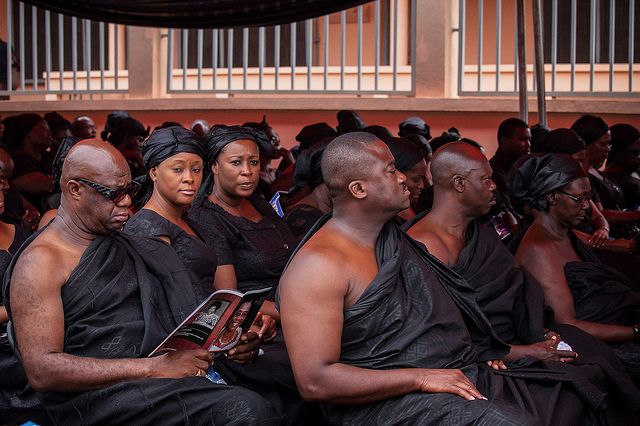In Ghana, funerals are not just solemn occasions—they are grand, vibrant celebrations of life, deeply rooted in tradition and community. While death brings mourning, Ghanaians also see it as an opportunity to honor the deceased, affirm their legacy, and unite the living.
In this post, we dive into the rituals, symbolism, fashion, music, and beliefs that shape Ghanaian funeral traditions today—region by region, culture by culture.
Why Are Funerals So Important in Ghana?
In Ghanaian society, a person’s funeral is seen as their final rite of passage. It’s a major event that reflects the status of the individual, the family’s love, and the community’s respect.
Funerals are also deeply spiritual. Many believe that the soul must be guided to the ancestral world with proper rituals—failing which, the spirit may linger and cause misfortune.
Key Funeral Traditions Across Ghana
1. Announcement & Wake-Keeping
- Once someone dies, formal announcements are made—sometimes through radio, posters, WhatsApp, and community gong-gong beating.
- A wake-keeping is held a night or two before the funeral. Family, friends, and mourners gather to share memories, sing dirges, and keep vigil.
2. Funeral Service & Burial
- Most Ghanaian funerals include a religious or traditional service, followed by a burial at the family cemetery or private land.
- In some Akan and Ewe traditions, the corpse may be displayed in ceremonial attire, and the burial follows specific rites.
3. Thanksgiving & Final Funeral Rites
- A thanksgiving church service is typically held the Sunday after the burial.
- The final funeral rites, sometimes weeks or months later, may include drumming, dancing, and feasting.
🪶 Did you know? Some Akan funerals have to wait months to give families enough time to raise funds and plan.
The Role of Culture & Ethnicity
Akan (Ashanti, Fante, Akuapem)
- Known for large, elaborate funerals, sometimes involving thousands of mourners.
- Wears red and black for mourning, with white worn on the day of thanksgiving.
- Often feature pallbearers dancing with the coffin, brass band processions, and custom kente patterns for the deceased.
Ga-Dangme
- Funerals are held quickly, but the “One-Week Celebration” is significant.
- Custom fantasy coffins shaped like fish, cars, or tools (popular in Accra) reflect the deceased’s profession or passions.
- The burial is followed by lively after-parties with food, drinks, and live bands.
Ewe
- The “30-Day” and “40-Day” rites are important.
- Emphasis on spiritual cleansing, ancestral veneration, and community rituals.
- Dirges and traditional drumming are central to the process.
Northern Ghana (Dagomba, Mole-Dagbani, Mamprusi)
- Islamic customs apply in many areas: burials are immediate, with prayers (Janazah) and quiet mourning.
- For non-Muslim ethnic groups, elaborate funeral dances and storytelling honor the spirit.
🔗 Explore more: Ghanaian Traditions Still Practiced Today
Music, Dance, and Attire
Music is crucial to Ghanaian funerals. From traditional drumming to gospel choirs and brass bands, the goal is to celebrate a life well lived.
Attire:
- Red & Black: Signify grief and mourning.
- White: Worn for thanksgiving or when the deceased was elderly and believed to have lived a “full” life.
- Custom Kente: Families may design a funeral-themed kente, known as Adinkra cloth, with symbolic prints.
📌 Learn More: Top 10 Traditional Ghanaian Clothing Styles and Their Meanings
The Cost of Ghanaian Funerals
Funerals in Ghana can be very expensive, sometimes even more than weddings. They often involve:
- Hiring bands and MCs
- Catering for hundreds of guests
- Designing funeral posters and banners
- Renting tents, chairs, and sound systems
Families sometimes sell land, take loans, or rely on contributions to finance the ceremonies.
The Rise of Modern Funeral Trends
In urban Ghana, funerals are evolving:
- Live streaming is becoming popular, especially post-COVID.
- Families are using funeral apps and QR codes for donations.
- Custom funeral brochures with photo biographies are common.
Despite these changes, core cultural practices remain intact—especially in rural areas.
Spiritual Beliefs & Ancestor Worship
Many believe that a proper burial helps the soul join the ancestors, who continue to watch over the living. Libations are poured, prayers offered, and names of the deceased are invoked during family rituals.
Some also hold that if the deceased is displeased, they can appear in dreams or cause misfortune until their spirit is appeased.

